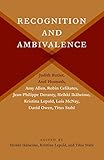Recognition and Ambivalence / ed. by Heikki Ikäheimo, Kristina Lepold, Titus Stahl.
Material type: TextSeries: New Directions in Critical Theory ; 77Publisher: New York, NY : Columbia University Press, [2021]Copyright date: 2021Description: 1 online resourceContent type:
TextSeries: New Directions in Critical Theory ; 77Publisher: New York, NY : Columbia University Press, [2021]Copyright date: 2021Description: 1 online resourceContent type: - 9780231177603
- 9780231544214
- 128.3 23
- B105.R23 R39 2021
- online - DeGruyter
| Item type | Current library | Call number | URL | Status | Notes | Barcode | |
|---|---|---|---|---|---|---|---|
 eBook
eBook
|
Biblioteca "Angelicum" Pont. Univ. S.Tommaso d'Aquino Nuvola online | online - DeGruyter (Browse shelf(Opens below)) | Online access | Not for loan (Accesso limitato) | Accesso per gli utenti autorizzati / Access for authorized users | (dgr)9780231544214 |
Browsing Biblioteca "Angelicum" Pont. Univ. S.Tommaso d'Aquino shelves, Shelving location: Nuvola online Close shelf browser (Hides shelf browser)

|

|

|

|

|

|

|
||
| online - DeGruyter Preventive Engagement : How America Can Avoid War, Stay Strong, and Keep the Peace / | online - DeGruyter Silencing the Bomb : One Scientist's Quest to Halt Nuclear Testing / | online - DeGruyter Chicago Sociology / | online - DeGruyter Recognition and Ambivalence / | online - DeGruyter Cinema by Design : Art Nouveau, Modernism, and Film History / | online - DeGruyter On Bicycles : A 200-Year History of Cycling in New York City / | online - DeGruyter Aging Behind Prison Walls : Studies in Trauma and Resilience / |
Frontmatter -- CONTENTS -- INTRODUCTION -- 1 Recognition Between Power and Normativity: A Hegelian Critique of Judith Butler -- 2 Recognition and the Social Bond: A Response to Axel Honneth -- 3 Intelligibility and Authority in Recognition: A Reply -- 4 Recognition and Mediation: A Second Reply to Axel Honneth -- 5 Historicizing Recognition: From Ontology to Teleology -- 6 Recognizing Ambivalence: Honneth, Butler, and Philosophical Anthropology -- 7 How Should We Understand the Ambivalence of Recognition? Revisiting the Link Between Recognition and Subjection in the Works of Althusser and Butler -- 8 Recognition, Constitutive Domination, and Emancipation -- 9 Return to Reification: An Attempt at Systematization -- 10 Negativity in Recognition: Post- Freudian Legacies in Contemporary Critical Theory -- 11 Beyond Needs: Recognition, Conflict, and the Limits of Institutionalization -- 12 Freedom, Equality, and Struggles of Recognition: Tully, Rancière, and the Agonistic Reorientation -- CONTRIBUTORS -- INDEX
restricted access online access with authorization star
http://purl.org/coar/access_right/c_16ec
Recognition is one of the most debated concepts in contemporary social and political thought. Its proponents, such as Axel Honneth, hold that to be recognized by others is a basic human need that is central to forming an identity, and the denial of recognition deprives individuals and communities of something essential for their flourishing. Yet critics including Judith Butler have questioned whether recognition is implicated in structures of domination, arguing that the desire to be recognized can motivative individuals to accept their assigned place in the social order by conforming to oppressive norms or obeying repressive institutions. Is there a way to break this impasse?Recognition and Ambivalence brings together leading scholars in social and political philosophy to develop new perspectives on recognition and its role in social life. It begins with a debate between Honneth and Butler, the first sustained engagement between these two major thinkers on this subject. Contributions from both proponents and critics of theories of recognition further reflect upon and clarify the problems and challenges involved in theorizing the concept and its normative desirability. Together, they explore different routes toward a critical theory of recognition, departing from wholly positive or negative views to ask whether it is an essentially ambivalent phenomenon. Featuring original, systematic work in the philosophy of recognition, this book also provides a useful orientation to the key debates on this important topic.
Mode of access: Internet via World Wide Web.
In English.
Description based on online resource; title from PDF title page (publisher's Web site, viewed 20. Nov 2024)


